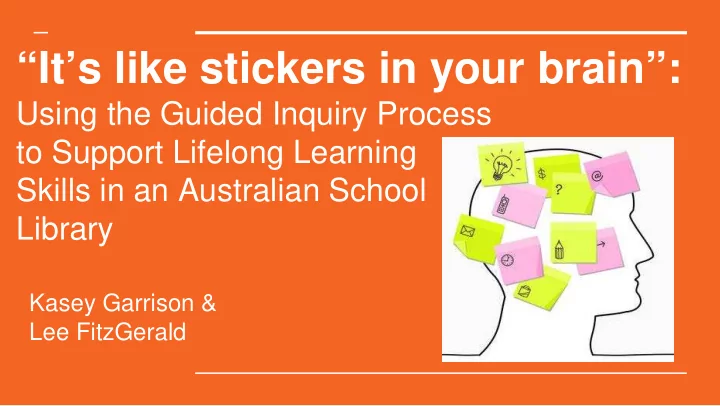

“It’s like stickers in your brain”: Using the Guided Inquiry Process to Support Lifelong Learning Skills in an Australian School Library Kasey Garrison & Lee FitzGerald
What is Guided Inquiry (GI)? ● Pedagogy grounded in a constructivist approach to learning based on the Information Search Process (ISP) (Kuhlthau; 1989a; 2004) ● Enriched with the Guided Inquiry Design process (GID) (Kuhlthau, Maniotes & Caspari, 2012; 2015) ● Focus on student autonomy in pursuing own interests ● Reflection in developing self-regulating learning skills ● Continuous support from teachers and teacher librarians
Kuhlthau, Maniotes and Caspari (2015) describe GI as “tak[ing] students beyond the pre-digested format of the text book into learning from a variety of sources to construct their own understandings” (p. 61). ● Community of research from various scholars Gordon & Todd, 2009; Kuhlthau, 1985, 1987, 1989a, 1989b, 1991, 1993, 2004, 2005; Kuhlthau, Heinstrom, & Todd 2008; Kuhlthau, Maniotes, & Caspari, 2012, 2015; Todd, 2012; Todd, Gordon, & Lu, 2010
Timely in Australian Context ● Curriculum changes emphasising inquiry learning ○ …but omitting a process to support it (Lupton, 2012) ● Supports in the form of ISP and GID (Kuhlthau, Maniotes, & Caspari, 2012; 2015)
● ● ● ● Introduction to Developing Discovering Ponder what the project and identifying interesting was discovered ● Building background ideas in the first ● Pursuing what curiosity and knowledge stages becomes ● ● Identifying an interest in Connecting to personally inquiry topics content interesting question and ● Maintaining an topic open mind Icons used with permission.
● ● ● Collecting information Answering inquiry Assess the on the topic and question through achievement of question synthesis of research learning goals ● ● ● Researching broadly Creating final product Reflect on the content and deeply to communicate ideas and creation ● ● Reflection on the Sharing with process classmates and researchers
Research Question ➔ How do students use and interpret the GID process whilst engaged in research projects?
GI Unit Participants ● Research in History and ● Year 7 Students Geography ● All girls independent ● Semesters 1 and 2 Catholic school in ● Research booklet Sydney ○ Document process ● 33 volunteers ● Final Product- Essay Complete data from 16 and Oral Presentation
Study Progression- 2015 school year GI Unit 1 GI Unit 2 Research Booklets marked Research Booklets marked Final Products marked Final Products marked April-May June September-October November Focus Groups Focus Groups 1 2 Semi-structured Less structured interview guide interview guide
Content Analysis of Transcripts • Deductive Approach Emergent Codes and Subcodes • GID Stages • Element of Choice • Personal & Academic Rewards • Reflection
Stages of the GID Process ● Noted as positive, helpful aspects of breaking into stages ● Found in previous research with TLs (Garrison & Spruce, 2016) Madalyn Holly Bell “I am splitting it up “…they don't just push you in with all so I can get each of the information...They really take little part done as you through it with the different efficiently as stages, so ok, I’ve finished this possible.” stage, then the next stage.”
Specific Eternity “because you could stages get to find out about more, not just your area of focus…I noted as found that really fun.” useful. Sleeping Beauty “helped me reflect on what I already knew. So that really helped me because I knew what to go for.”
Choice is good. Sleeping Beauty “creating your own question meant we could kind of explore our interests and decide what Cinderella we wanted to find out “it was good that we were able to about those places.” make our own [question] because sometimes that can make more sense than what you are given because it is what you think rather than what you are told to.”
Ariel Personal “…I really liked the GI actually, I Rewards found it was really refined … using it to create questions and stuff that I feel as if, it’s more the way to kind of be a part of it, more than just writing a speech or something like that, whereas answering questions and stuff makes you feel more connected to the project.”
Royal Academic “I found many more websites Rewards and things I could look at in other subjects as well so not just history and this area, but I’ve learnt to do it in English and other subjects, and learning about more reliable sources.”
“I also really, Reflection really dislike reflecting mainly “it’s kind of just, because I think ok, I finished it’s totally “...reflecting on now just what therapeutic and the whole did I do? What I don't like those process kind of worked? What sort of things that brought the didn't for next you get in a whole thing time?” therapy session.” together .” Madalyn Eternity Anastasia
Future Directions Limitations ● Working on GI with the ● Teachers’ inexperience teachers with GID process ○ Professional ○ Lack of understanding development sessions ○ More ownership of GI ● Nature of sample ● Following same girls ○ Small, Catholic through Year 8 independent all girls ● Replicate with a dissimilar school in affluent urban sample of students suburb
● Development of metacognitive skills and strategies ● Need for collaboration between teachers and SIGNIFICANCE teacher librarians ● Importance of growing a wider base of research on the GID process for support
References available in paper proceedings.
Grazie Merci Gracias Vinaka Aayya Grazas Danke Mahsi Ga Toda Efcharisto Haw aa Takk Imena Barkl Tenki ya Arigato Osyo Melesi Kulo Mesi Cheers Komapsumnida Thank you Ah bo Da ja Achiu Asantte Nandi Grazzi Sanco Mossi Xie xie Pojo Bisse Koko Wneeweh Barka Ka Aio Asai Thenks Mamnoon Paylla
Recommend
More recommend